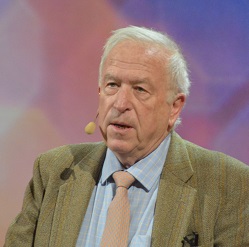Simon Blackburn facts for kids
Quick facts for kids
Simon Blackburn
|
|
|---|---|

Blackburn in 2017
|
|
| Born | 12 July 1944 Chipping Sodbury, Gloucestershire, England
|
| Alma mater | |
| Era | Contemporary philosophy |
| Region | Western philosophy |
| School | Analytic philosophy |
| Institutions |
|
| Academic advisors | Casimir Lewy |
| Doctoral students |
|
|
Main interests
|
|
|
Notable ideas
|
Quasi-realism |
Simon Walter Blackburn (born 12 July 1944) is an English philosopher. He is famous for his ideas about ethics (the study of what is right and wrong) and the philosophy of language. Blackburn is also known for making philosophy easier for everyone to understand. He has appeared on TV shows like Closer to Truth to talk about big ideas.
Over his long career, he has taught at some of the world's most famous universities, including Oxford University, Cambridge University, and the University of North Carolina, Chapel Hill.
Contents
Life and Education
Simon Blackburn was born in Chipping Sodbury, England, on July 12, 1944. He first studied philosophy at Trinity College, Cambridge, and earned his bachelor's degree in 1965. He later received his doctorate, the highest university degree, from Churchill College, Cambridge in 1969.
He taught at the University of Cambridge until he retired in 2011. Even after retiring, he continued to teach as a research professor at the University of North Carolina at Chapel Hill. He is also a Fellow at Trinity College, Cambridge, which is a special honor.
Blackburn has received many awards for his work. In 2002, he was elected a Fellow of the British Academy, a group of the top scholars in the United Kingdom. In 2008, he was also made an Honorary Fellow of the American Academy of Arts & Sciences.
Blackburn's Big Ideas
Blackburn is a major figure in a type of philosophy called Analytic philosophy, which uses logic to understand big questions. He is most famous for an idea called quasi-realism.
What is Quasi-Realism?
Quasi-realism is an idea about where our morals come from. Blackburn suggests that when we say things like "stealing is wrong," we are not stating a fact about the universe. Instead, we are expressing our feelings or attitudes about stealing.
However, even though these are our feelings, we can still talk about them as if they were true or false. This is the "quasi-realist" part. "Quasi" means "almost" or "as if." So, we treat our moral beliefs as if they are real facts. This allows us to have serious discussions about what is right and wrong.
He is also known for supporting ideas inspired by the philosopher David Hume. These ideas often focus on the role of human feelings and experiences in how we understand the world.
Making Philosophy Public
Blackburn believes philosophy shouldn't just be for university professors. He has worked to share philosophical ideas with a wider audience. He has appeared on British radio shows, like BBC Radio 4's The Moral Maze, to discuss moral issues.
Views on Religion
Blackburn is a patron of Humanists UK, an organization that promotes a non-religious approach to life. When asked about his beliefs, he said he prefers the word infidel to atheist. An atheist is someone who does not believe in God. Blackburn explained that being an "infidel" simply means he lives without religious faith.
He once said, "I have no faith in the Loch Ness Monster, but do not go about trying to prove that it does not exist." He uses this example to explain that he doesn't feel the need to prove that God doesn't exist; he simply doesn't have faith.
In 2010, he joined other public figures in signing a letter that expressed concerns about the government's role in a visit by Pope Benedict XVI to the UK.
Important Books by Blackburn
Simon Blackburn has written many books on philosophy. Some are for experts, while others are introductions for people new to the subject.
- Spreading the Word (1984) - A book about the philosophy of language.
- Essays in Quasi-realism (1993) - A collection of his essays explaining his most famous idea.
- The Oxford Dictionary of Philosophy (1994) - A popular dictionary of philosophy terms that he wrote.
- Think: A Compelling Introduction to Philosophy (1999) - A book written to get anyone interested in thinking about life's big questions.
- Being Good (2001) - An easy-to-read introduction to ethics. It was also published as Ethics: A Very Short Introduction.
- Truth: A Guide (2005) - A book that explores the different ways philosophers have thought about truth.
- Mirror, Mirror: The Uses and Abuses of Self-Love (2014) - This book looks at different philosophical ideas about self-esteem and pride.
See also
 In Spanish: Simon Blackburn para niños
In Spanish: Simon Blackburn para niños
 | Claudette Colvin |
 | Myrlie Evers-Williams |
 | Alberta Odell Jones |

